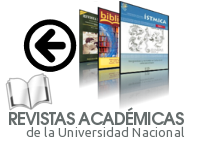The Virtual and Bimodal Courses as a Tool for the Updating of Teachers of Social Studies and Civic Education
DOI:
https://doi.org/10.15359/rp.17.4Keywords:
Lifelong Education, Hybrid Learning, Virtual Education, Social Studies, Online Learning, Teaching Method InnovationsAbstract
The present work exposes the results obtained within the Bimodal Continuing Education project promoted by the School of History of the National University of Costa Rica during the year 2017. This project has a validity of three years, beginning work in 2016. The project aims to implement virtual and bimodal courses as an update strategy for the Social Studies and Civic Education faculty. The academic activity has been valued in a positive way by providing teachers from all over the country with updating options using technological resources, allowing them to combine their daily tasks with updating activities that can be applied in the place and time they wish. Therefore, courses that combine virtuality with hybrid learning –blended learning– are becoming increasingly necessary in university contexts as a way to extend academic work and support the graduate community.
References
Alfaro, M. (2007). La formación continua de los docentes de la UPEL en materia curricular. Caracas, Venezuela: Universidad Pedagógica.
Bruns, B. & Luque, J. (2014). Profesores excelentes: cómo mejorar el aprendizaje en América Latina y el Caribe. Washington, EE. UU.: Banco Mundial.
Escuela de Historia (2014) Diagnóstico de necesidades de actualización de docentes de Estudios Sociales y Cívica. Heredia, Costa Rica: Universidad Nacional.
Estado de la Nación. (2011). Tercer Informe del Estado de la Educación. San José, Costa Rica: CONARE.
Fredin, E. (2017). Aprendizaje híbrido: ¿el futuro de la educación superior? Tecnológico de Monterrey: Observatorio de Innovación Educativa. Recuperado de URL: https://observatorio.itesm.mx/edu-news/2017/10/13/aprendizaje-hibrido-el-futuro-de-la-educacion-superior.
García, L., Ruiz, M. & Domínguez, D. (2007). De la educación a distancia a la educación virtual. Barcelona, España: Ariel.
Gutiérrez, M.; Buitrago, O. & Valencia, V. (2015). Prácticas educativas reflexivas y la formación del profesorado. Pereira, Colombia: Editorial Universidad Tecnológica de Pereira.
López, C. & Heredia, Y. (2017). Marco de referencia para la evaluación de proyectos de innovación educativa. Guía de Aplicación. Tecnológico de Monterrey, URL: http://escalai.com/que_escalai/guia_app/.
Salmon, G. (2004). E-actividades. El factor clave para una formación en línea activa. Barcelona, España: Editorial UOC.
UNED. (2011). Cómo diseñar y ofertar cursos en línea. San José, Costa Rica: EUNED.
Velazco, A. (2014). El sistema integral de educación continua (Tesis de Maestría). Pontificia Universidad Católica del Perú, Lima.
Downloads
Published
How to Cite
Issue
Section
License
Los autores que publican en esta revista están de acuerdo con los siguientes términos:
a) Los autores conservan los derechos de autor y garantizan a la revista el derecho de ser la primera publicación del trabajo bajo una Licencia Creative Commons Atribución-NoComercial-CompartirIgual 4.0 Internacional (https://creativecommons.org/licenses/by-nc-sa/4.0/) que permite a otros compartir el trabajo con un reconocimiento de la autoría del trabajo y la publicación inicial en esta revista (componente BY o atribución). Coincidente con la política de Acceso Abierto, no se podrán hacer usos comerciales de los contenidos publicados por esta revista (componente NC). Se permitirán las obras derivadas (remezcla, transformación o creación a partir de la obra original) siempre y cuando sean distribuidas bajo la misma licencia de la obra original (componente SA).
b) Los autores pueden establecer por separado acuerdos adicionales para la distribución no exclusiva de la versión original de la obra publicada en la revista (por ejemplo, situarlo en un repositorio institucional o publicarlo en un libro), siempre y cuando: a) sea reconocida la publicación original en esta revista (componente BY); b) no se haga uso del material de reuso con propósitos comerciales (componente NC); c) el material de reuso sea distribuido bajo la misma licencia de la obra original (componente SA).
c) Se permite y se anima a los autores a difundir sus trabajos electrónicamente (por ejemplo, en repositorios institucionales o en su propio sitio web) antes y durante el proceso de envío, ya que puede dar lugar a intercambios productivos, así como a una citación más temprana y mayor de los trabajos publicados (Véase The Effect of Open Access) (en inglés).


_11.55_.09_a_._m_._.png)
_1.34_.01_p_._m_._2.png)
_9.45_.02_p_._m_._.png)




_2.23_.09_p_._m_._.png)
_2.35_.17_p_._m_._.png)

